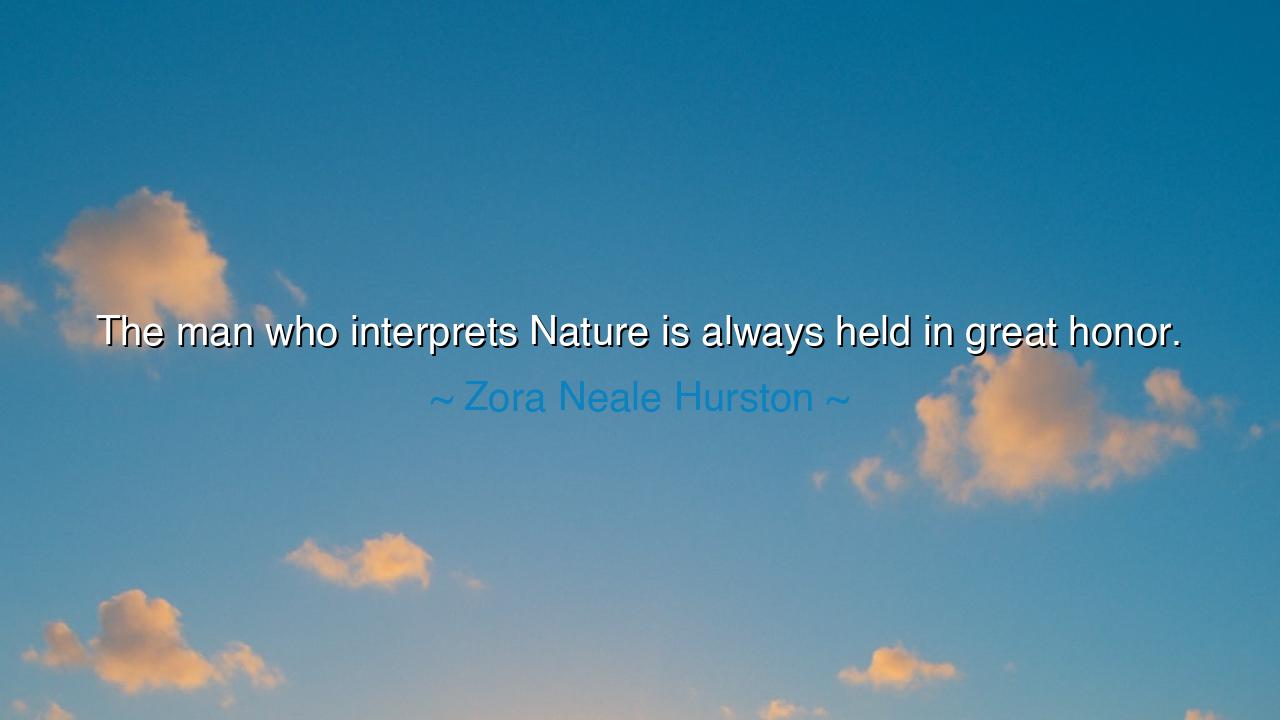
The man who interprets Nature is always held in great honor.






Zora Neale Hurston, seer of culture and teller of truths, once declared: “The man who interprets Nature is always held in great honor.” These words, though simple, touch the deepest roots of human history. Since the dawn of time, mankind has looked to the world around him — the stars above, the rivers that flow, the winds that whisper — and asked: What do these signs mean? Those who could answer, who could translate the language of the earth into wisdom for the people, were exalted above all others. They became priests, prophets, scientists, and poets — honored not merely for what they knew, but for what they revealed.
The ancients bore witness to this truth. The Babylonians honored the watchers of the heavens, those who charted the movements of the stars and foretold the seasons. The Egyptians revered their scribes and priests, who read the flooding of the Nile and aligned the pyramids with the constellations. To the Greeks, philosophers like Aristotle and Heraclitus, who sought to understand the laws of Nature, were held in reverence not only as thinkers but as guides for living. Always, the one who could interpret the mysteries of Nature — her cycles, her order, her hidden voice — was given honor, for he held the keys to survival, prosperity, and meaning.
Hurston herself, as a folklorist and anthropologist, was deeply attuned to this pattern. She listened to the rhythms of culture as one listens to the wind in the trees. To her, interpreting Nature was not confined to plants, storms, or soil, but extended to the living expressions of human life: stories, songs, traditions. In honoring the interpreters of Nature, she also honored the storytellers of her people, who preserved wisdom and gave shape to experience. Just as ancient priests spoke for the heavens, these keepers of culture spoke for the soul of a community.
Consider, too, the story of Galileo. When he lifted his telescope to the skies, he read Nature in a new way, discovering that the earth was not the center of all things. For this, he was punished, mocked, and silenced in his own day. Yet time has proven Hurston’s words: he is remembered with honor, not as a heretic but as one who gave humanity a clearer vision of its place in the cosmos. The interpreter of Nature may be resisted, but in the end, honor finds him, for truth outlives resistance.
The deeper meaning of Hurston’s quote is this: mankind craves interpretation. The world speaks, but not all can hear. It is vast, mysterious, sometimes cruel, sometimes generous. The one who stands between Nature and the people — who can read her patterns, unveil her secrets, translate her beauty and her warnings — is cherished because he or she transforms confusion into clarity, fear into wisdom, and chaos into order. Honor flows to such figures because they bring light to darkened paths.
The lesson for us is clear. Each of us should strive to become an interpreter of Nature in our own way. For some, this means studying the sciences — reading the language of stars, soil, oceans, and atoms. For others, it means art — capturing the voice of Nature in words, music, or paint, so that others may feel what they cannot see. For still others, it may mean living in such harmony with the earth that their very life becomes a teaching. What matters is not the form, but the devotion: to listen, to learn, and to share.
Practically, this means cultivating attentiveness. Walk beneath the sky and watch the seasons turn. Learn the names of trees, the phases of the moon, the migrations of birds. Read not only books but the book of the earth itself. And then, share what you learn with others — as Hurston did with the traditions she preserved, as scientists do with the laws they uncover, as poets do with the songs they compose. For in giving interpretation, you too will find honor — not in glory for yourself, but in service to those who seek meaning.
Thus Hurston’s words endure as a call: “The man who interprets Nature is always held in great honor.” Let them be both inspiration and command. Do not walk blind upon this earth. Learn to read the signs around you, and become a voice that speaks the truth of what you see. For in every age, those who listen to Nature and reveal her wisdom are the ones who leave behind not dust, but legacy.






AAdministratorAdministrator
Welcome, honored guests. Please leave a comment, we will respond soon